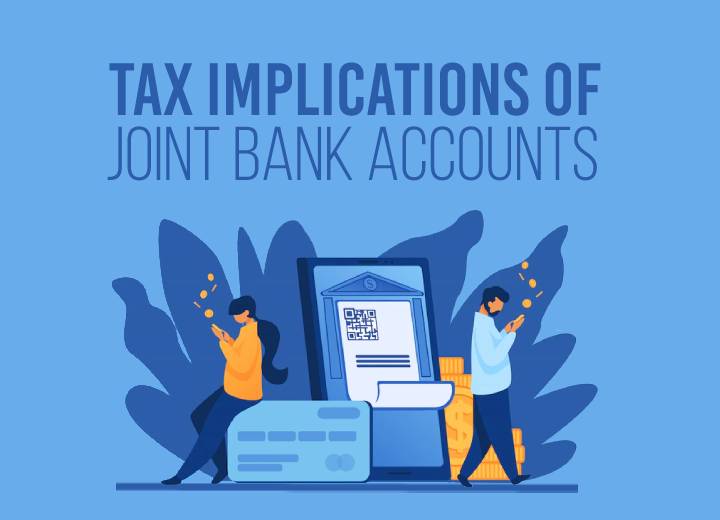Nothing could be as trustworthy as a Joint Bank Account when sharing. While joint accounts have several advantages since they give equal access to both parties, they also have disadvantages. And when you apply for a joint bank account, the last thing that strikes your mind is the joint bank account taxes and how o they work. Sometimes it is quite easy to figure out the joint account taxes; however, you have to face some difficulty figuring out the taxes.
Read on to learn about what is a joint account and who pays tax on joint bank accounts:
Table of contents
What is Joint Account Tax?
Joint account tax is a form of tax that is levied on the income earned from an account that is co-owned by two or more people. For instance, if there is any interest earned on a joint account, then that amount will be taxed under joint account tax laws. This tax needs to be deposited by the account owners to the income tax department.
By practice, the tax liability is split equally between all the owners of a joint account, however the joint account tax statement is issued to the main account holder. Generally, this individual’s TIN number has to be quoted on the account. If the main account holder wants to split the income with the other holders for tax purposes, they might be required to submit additional tax forms to the relevant authorities.
Learn About the Tax Implications of Joint Bank Accounts
In case the interest of a joint account and FD is over Rs. 10,000 per annum, the TDS (Tax Deducted at Source) is implied on the primary holder of the account. If it is a joint account of two people not related to each other such as business partners, it is not subject to the deduction for withdrawals of up to Rs. 50,000.
Most people open joint accounts to enjoy benefits equally regarding deposits and withdrawals. But needless to say, there is one primary account holder in a joint account, and the rest are considered secondary. The bank’s responsibility is to instruct you about the primary and secondary holders for clear identification.
There are several benefits of joint accounts. If a married couple wishes to buy a property or a house and an asset together, they will have to open a joint account in the first step. This means that the husband and the wife both will have their names on the purchase deed of the house, and both can claim deductions on the EMI while filing taxes.
Another main benefit of a joint bank account is that if one of the account owners passes away, the survivor will automatically get full control of the account. It will not require any legal document like a will.
What are the Limitations of a Joint Account?
There are certain limitations in joint accounts. For example, if you have a joint account with someone, you both can withdraw money from the account; however, no one of you can overdraw or create bills of exchange. Thus, it is important to open a joint account with someone you can have the utmost trust in.
Another issue you face with joint accounts is that your credit history will not be the same as the one you share your account with. For example, if your credit history is poor, the other account holder’s credit history will also be reflected as poor. Thus, it is essential to repay your credit-funded transactions and expenses brought off via your joint account to avoid bad credit scores.
It is important to be extra careful while choosing the primary and the secondary account holder. If your joint account is inter-liked with your FD in the same account and your earned interest on it is more than Rs. 10,000 annually, the bank will deduct the TDS in the primary account holder’s name. There will be no deduction in the name of the secondary account holder.
If you open a joint account with your relative and one of you withdraw money, the money withdrawn will be interpreted as a gift to the other. And since the gift received from the relatives is free from tax, there will be no tax charged to the receiver.
In addition, if it is a joint account of non-related people such as business partners, there will be no tax charged on withdrawals of up to Rs. 50,000. However, in case there is a withdrawal of more than Rs. 50,000, then the tax will be charged. And the person who will be charged for the tax will be the receiver of the amount.
You May Also Read:
Frequently Asked Questions:
What is the tax implication of Joint Bank Accounts?
For the interest of a joint account and FD of more than Rs. 10,000 per annum, the tax is implied on the account’s primary holder. For the cases where joint account holders are not related to each other such as business partners, there are no deductions for withdrawals of up to Rs. 50,000.
Who can file tax on a joint account?
Both the account holders will pay taxes on their joint account. And the amount due for both owners will depend on their share of the account. However, just one owner can also choose to pay the entire tax.
How does the tax work on a joint account?
Two or more people can open a joint account, and all of them will be able to access the money. Also, there is no different space on a tax return to declare interest on joint accounts. Taxpayers will have to include their share of any interest on their joint account to the whole interest amount earned on an individual account or accounts.
What are the disadvantages of a joint account?
Below are some of the major drawbacks of a joint account:
- Inequity
- Shared liability
- Lack of privacy
- Access
- Reduced benefits
Can one person withdraw all the money from a joint account?
Yes. Any account holder can take all the money out of their joint account, even without the other owner’s permission. Thus, if a relationship sours, one account holder can legally withdraw the whole amount.
Who owns the money in a joint account?
Both owners of the joint account own the money. Both account holders can use or withdraw as much money as they wish (even in the case of money deposited by another). The bank doesn’t differentiate between the depositor of the money and the other.













































